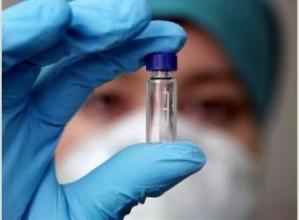JUDY WOODRUFF: Next, a long looked-for breakthrough in the battle against the deadly Ebola virus. One experimental vaccine has been shown to be 100 percent effective on humans.
Hari Sreenivasan has the story.
HARI SREENIVASAN: The results of a two-year trial led by the World Health Organization were published in the journal "Lancet" yesterday. They showed that of nearly 6,000 people vaccinated in Guinea last year, none had contracted Ebola after a ten-day period. While in the group not vaccinated, 23 cases developed.
The vaccine still needs regulatory approval, but is considered so effective that some 300,000 doses have already been stockpiled. The 2014 Ebola epidemic in West Africa killed 11,000 people.
For more on this promising news, we turn once again to Dr. Anthony Fauci. He's director of the National Institute for Allergy and Infectious Diseases, and has long been involved in vaccine development.
Dr. Fauci, everyone's pretty excited about the 100 percent efficacy rate. Let's look under the hood a bit. This isn't the same type of clinical trial that we're used to in drug approval or vaccine approval, is it?
DR. ANTHONY FAUCI, Director, National Institute of Allergy and Infectious Diseases: No, it's a bit unusual. The vaccine trial is referred to as a ring vaccine trial which means that cases were identified in Guinea that indeed had Ebola. Then, instead of preemptively ahead of time vaccinating whole groups of populations, the individuals were divided into two separate groups, groups that were vaccinated immediately who had contact with the index case or cases or contact of contacts, and another group that was vaccinated 21 days later.
So, it was more of an acute response to an outbreak by trying to protect those people who were, in reality or potentially exposed to the index cases. That's not the standard way that you do a vaccine trial.
And so, although these results are really quite encouraging, there is still a lot more work to be done on vaccines for Ebola, and that's exactly where we're heading with this, to get many more people in a larger trial and to also determine, is the effect durable? In other words, if I vaccinate you now, will you be protected six months, eight months or a year from now and just how powerful that protective response would be.
And that's really the kinds of questions that still remain a bit unanswered, despite the fact that this finding now from the Guinea trial is really quite impressive.

HARI SREENIVASAN: There was one vaccine that was tested at the center of this, but there are multiple strains of Ebola.
DR. ANTHONY FAUCI: That's another question that needs to be answered and it's a good point that you bring up. This vaccine that was tested in Guinea against the Zaire strain of Ebola.
There are more than one strain, particularly, a second train called the Sudan strain, but maybe two other strains. And when we ultimately get the vaccine that what we would consider to be the optimal season, we would want one that, A, has a great durability of effect, that would be effective over a considerable period of time, and, B, something that would be able to protect essentially against all strains of Ebola, because there are different strains that pop up in different parts of sub-Saharan Africa, and we have clear-cut experience with that.
HARI SREENIVASAN: So, given the test that's just been done with this specific vaccine, this is not like a polio vaccine where you get it once in your life and you're vaccinated. You're still going to need a lot more tests to figure out that combination of different viruses and how long they last.
DR. ANTHONY FAUCI: Absolutely. Those are critical questions that you ask. This — some people when they hear about how really impressive the results are, they think, OK, we're done now with the Ebola vaccine, we're going to move on because we've solved the problem.
We haven't come anywhere near solving the problem because there are still so many unanswered questions that we need to pursue before we get a vaccine that we feel would be universally able to be widespread administered to people to protect them from outbreaks of Ebola of multiple different strains. There's a lot of work to be done.
HARI SREENIVASAN: All right. While we have you, I also wanted to just ask you about the avian flu that's in Asia right now. We're reporting about the millions of birds in Korea and other parts of Asia that have been culled already. How concerned should we about this?
DR. ANTHONY FAUCI: We need to pay attention to this. I don't think there's any real need to panic at all about it, because we have been following outbreaks of bird flu for decades. The first time we got involved with it here was back in the '90s in Hong Kong when you had the H5N1 which are viruses that are influenza viruses that are fundamentally viruses of fowl, water fowl, or chickens, sometimes pigs and other animals. They rarely jump into species and infect humans, and when they do infect humans, they do not efficiently spread from human-to-human. That's where most of the bird flu situation is right now.
But having said that, we always have to be alert for the threat or the possibility that they may, when they jump species like from a chicken or another type of a fowl to a human, that they then become really efficient in spreading from person to person. We've not seen that thus far. Hopefully, we'll never see it, but we've even begun trying to develop vaccines against some of these avian type flu. So, no need to panic but don't just blow it off. We've got to keep our eye out on it.
HARI SREENIVASAN: All right. Dr. Anthony Fauci, thanks so much.
DR. ANTHONY FAUCI: Good to be with you.













